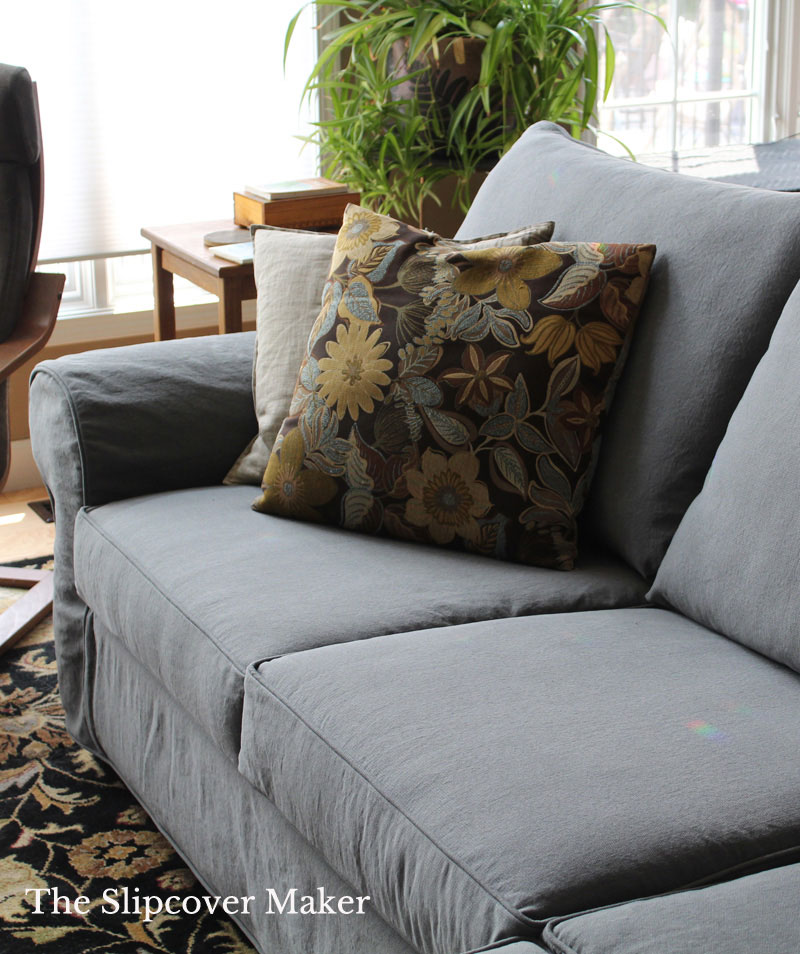How Long Will My Slipcover Last?

Hello everyone! In today’s post I want to answer your most frequently asked questions about slipcover longevity:
- How many years will my slipcover fabric hold up?
- Can a slipcover made in the most durable fabric be washed every month, or more frequently, and still maintain its fit and function?
Now, I can talk your ear off about washable slipcover fabrics — which weaves and weights are most durable under normal wear and tear, what to expect in terms of shrinkage and wrinkle and how the fabric looks & feels after washed. I even include a “best used for…” recommendation in my reviews of favorite washable fabrics.
But, what I can’t tell you is exactly how long your slipcover fabric will last. In fact, fabric manufactures and retailers don’t have the answer either. Here’s why…
A slipcover’s longevity depends not only on how durable the fabric is but also the kind of wear it gets and how you care for it.
Food spills, kids, pets, excessive washing, harsh detergents, frequent bleaching, over drying, cat scratches, direct sun, stain repellent sprays, pee-pee accidents and mold take a toll on slipcover fabrics.
For example, the #12 weight natural duck is the toughest cotton cloth I recommend for slipcovers that get heavy traffic and frequent washings. Can it be washed once a month? Technically, yes. However, even though that fabric is super durable and long wearing, a monthly wash combined with bleach and daily cat scratches will accelerate wear and shorten the life of the slipcover.
When you use and launder your slipcover in ways that exceed the fabric manufacturer’s intended use and care instructions there is no telling exactly how long your slipcover will perform with good results.
The best thing you can do to ensure your slipcover will last as long as possible is to choose the most durable, washable fabric for your needs. Then, keep your slipcover in good shape. Here’s what I recommend:
1. Choose a tightly woven denim, canvas, linen or hemp fabric in a weight that matches the function of your slipcover.
- Light weight or “drapery weight”, 7 ounce: Best suited for slipcovers that get occasional use and few washings.
- Medium weight, 8 to 10 ounce: A good choice for slipcovers that get moderate use and require only one or two washings per year.
- Heavy weight, 12 ounce: Best option for high traffic slipcovers that require washing every few months. Great for families with pets and/or kids.
- Heavy duty weight, #12 (11.5 ounce): refers to cotton duck woven with 2-ply yarns. This #12 weight canvas has double the yarns woven across the width of the fabric. It’s a denser, tighter weave than 12 ounce canvas. Makes a tough, heavy-duty slipcover that will hold up to heavy traffic and several washes per year.
2. Have realistic expectations about your fabric’s performance and longevity.
Just because a fabric is considered durable and washable doesn’t necessarily mean it will hold up indefinitely to anything you throw at it year after year.
Keep in mind a washable slipcover will wash, wear and age very much like any other natural fiber textile item you use on a regular basis like cotton denim jeans, canvas cargo shorts, cotton sheets and towels.
Overtime you can expect some stains, fading, shrinkage, maybe a few ripped seams and definitely thread bare spots if you bleach regularly and allow pets on your furniture.
3. Extend the life of your slipcover with proper care.
Keeping your slipcover in good shape for as long as possible depends not only on the type of wear it gets but also how you care for it. Try these tips for best results:
- Preshrink your fabric before you start your slipcover project to avoid shrinkage later on.
- When it’s time to clean your slipcover, machine wash it in cold. Tumble dry warm. Don’t over dry. Avoid high heat. Remove your slipcover from the drier while it’s slightly damp. Put it on your furniture to dry completely.
- Avoid chlorine bleach. It weakens/deteriorates natural fiber over time. Opt for a safer, non-chlorine product instead like OxyClean.
- Avoid laundry detergents with optical whiteners. They tend to fade color.
- Always test stain repellent and stain remover products on a large scrap of your washed fabric before you apply it to your slipcover. Beware: some products will discolor fabric.
- Use arm covers to protect your slipcover from dirt and wear.